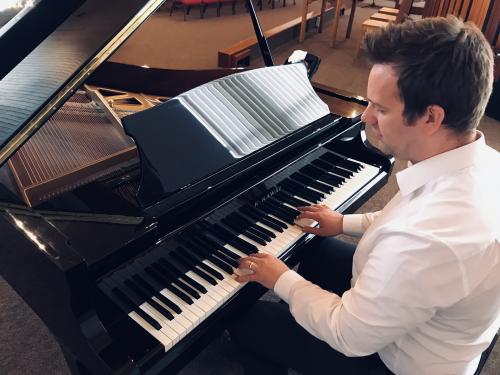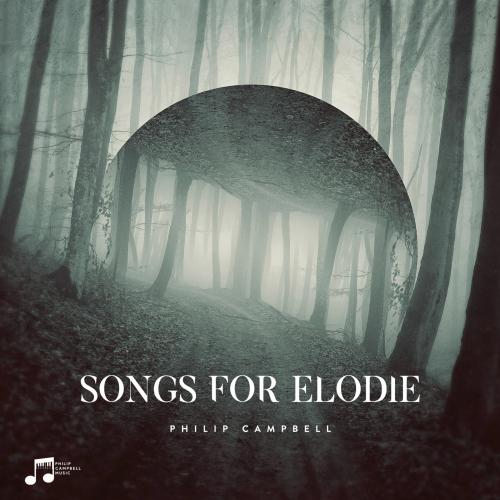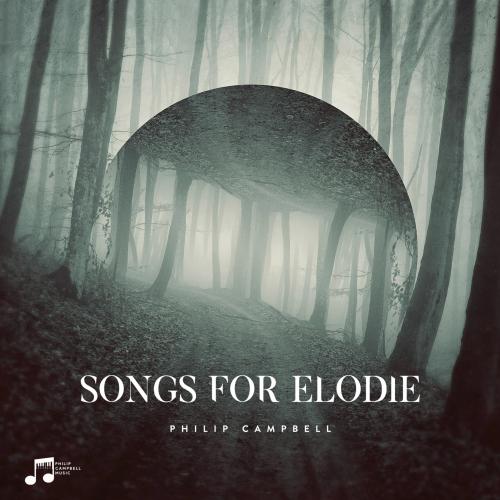Philip Campbell
Northern Ireland, UNITED KINGDOM Official WebsiteFacebookTwitterSpotifyPandoraAppleMusicBandCampSoundCloudYouTube
Official WebsiteFacebookTwitterSpotifyPandoraAppleMusicBandCampSoundCloudYouTubeAfter a few years of piano lessons as a child, Philip Campbell switched focus and taught himself guitar, bass and 5 string banjo; playing regularly in his local church and as part of a bluegrass group.
In 2016, Philip heard Ludovico Einaudi's 'I Giorni' for the first time and fell instantly in love with the simplistic beauty of solo piano.
With a reignited passion for the instrument, Philip was inspired to write his own compositions, culminating in his debut album release 'Songs For Elodie', named after his first daughter 'Elodie' born in January 2020.
Albums
“Songs For Elodie” reviewed by Pam Asberry

Irish pianist and composer Philip Campbell was born into a musical family. He studied both piano and violin as a child, and at age fourteen, inspired by the guitar solos of AC/DC guitarist Angus Young, he taught himself to play guitars, bass and banjo. His musical influences were varied and eclectic, including everything from church music to rock and bluegrass, but it was a performance by Ludovico Einaudi that reignited his love for piano, after which he began studying the classics. Over the past four years he has composed more than thirty works for solo piano, culminating in “Songs for Elodie,” his debut album of eleven thoughtfully curated pieces named after his first daughter, who was born in January 2020.
The album opens with “Sweet Dreams,” a tranquil lullaby featuring a sweet melody singing over a gently swaying left hand. Borne from hours spent soothing his daughter to sleep by gently humming a lullaby, this piece took me back to the days of rocking my own children to sleep in the wee hours of the night. The melancholy “No Way Out” is tinged with anguish and desperation; the music becomes quite intense, almost argumentative at times, and there are brief references to Chopin’s “Revolutionary Etude.” But the piece ends quietly, with an air of resignation.
A butterfly’s “chrysalis” is a well-known symbol of transition, and Campbell’s piece bearing the same name is a musical representation of the change. It opens in the dark lower registers of the piano, grows in severity, perhaps invoking life’s challenge and difficulties. A gradual climbing up the keyboard is followed by the thematic material from the opening played more slowly and more gently, indicating a successful transition into a thing of beauty. The haunting “Strange” captures that eerie, unsettling sensation – almost bordering on fear – experienced in the presence of something unknown and unfamiliar.
“Melody for Elodie, the last piece Campbell composed before his daughter was born and expresses pure joy and wonder, and is followed by “Daydream,” a soaring, compelling creation of Campbell’s imagination. More improvisational in nature than the rest of the pieces on the album, its fanciful melody rises and falls in surprising and unexpected ways.
One of my favorite pieces on the album, “Gentle” is charming in its simplicity, achingly tender and soothingly sweet. Another favorite, “Seeking, begins questioningly, builds in intensity fraught with strife and turmoil, and ends peacefully, as if that which was being sought has been found.
“Almost Home” perfectly captures that emotion experienced at the end of a journey, eagerly anticipating reuniting with the places and people a traveler holds most dear. “Clouds” is meandering and dreamy, put me in mind of lazy childhood afternoons spent lying on my back in our grassy backyard, gazing up into the sky and imagining all sorts of scenes floating by in the clouds. The shortest piece on the album, “The Journey,” clocking in at just over a minute and thirty seconds, brings the album to a succinct and satisfying conclusion.
Striving to develop both as a performer and a human being as he revisits unfinished projects and learns to be the best father he can be, Philip Campbell seems to have found his true path and I am already looking forward to future releases. Very highly recommended!

